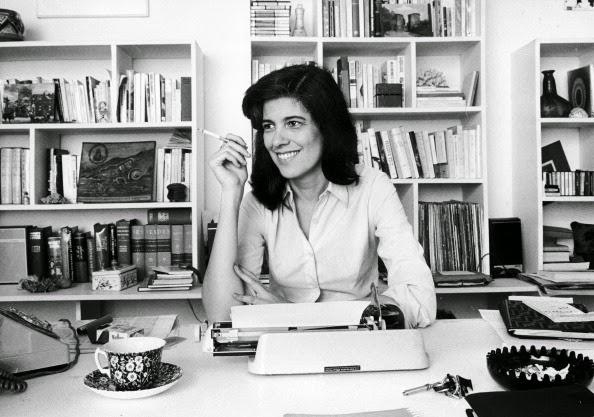It’s been an angry year for many people the world over. And we can hear that anger as a backdrop to the conversations here, outside Philadelphia, where The Book Haven is otherwise immersed in poetry at the West Chester Poetry Conference this weekend. A few days ago we reposted some remarks by the late Susan Sontag. Here are a few observations about her from Craig Seligman, author of Sontag & Kael: Opposites Attract Me.

Sontag in 1972. The very act of writing implies the opposite of despair.
She never claimed she never erred; in fact, she took pride in correcting her errors. But she was always an angry writer, and her anger angered her readers, roiling around in the mind until – magically – it settled into thought.
She was angry at the philistinism of the consumer culture into which she had the good and bad luck to be born, and what I feel most bereft over is the loss of that anger, since more than ever it seems like the only rational response to the society we live in. One reason, I believe, she so often limited her literary essays to praise was that once she started in the other direction she couldn’t stop. She didn’t handle her anger gracefully. That was why I never thought of her as a great political writer. The greatness was in her cool, hardheaded essays on aesthetic matters; as an aesthete defending the senses against the intellect, the new against the established, silence against noise, she was magnificently coldblooded. But she was hotblooded and hotheaded when she turned to politics. I still find myself backing off nervously from her vitriolic essays and speeches on the Vietnam War, even as I endorse the politics behind them. In those writings, frantic rage (“We are choking with shame and anger”) is motivated by a frantic need: to do something – namely, to stop the war. And for all the incendiary rhetoric, the spewing fury, the bitter eagerness to bite the hand of America, the urgency of the need to halt the war implied a hope – a shred of hope. Something could be done. The war could be stopped.
The political writing of her final years is different. I’m referring to her profoundly humane and reflective 2003 essay “Regarding the Pain of Others,” whose theme was atrocity pictures, and its magisterial pendant — written when she was already sick with the cancer that would, after 30 years, finally kill her – her 2004 essay “Regarding the Torture of Others,” on the Abu Ghraib photographs. The quality of the prose in those writings has changed because the quality of the anger has changed. But given the disheartening events that elicited that shift, not even Sontag — who could talk about cultural achievement with a Nietzschean absolutism that bordered on the callous could have taken much consolation from her triumph. By 2004, the United States was a society very different from what it had been even during the ugliest years of the Vietnam era, and the rage smoldering beneath every sentence of that great, judgmental final essay was a different order of rage: a rage without hope. Speaking out, speaking angrily no longer had a goal so simple as stopping the war, because the war was, in the phrase she hammered at with disquieting control, an “endless war.” “The torture of prisoners is not an aberration.” “The photographs are us.”
Those are despairing words, and since November that despair has become widely shared. But despair isn’t really a Sontagian emotion. It’s worth noting that her repeated “endless war” carefully avoids the easy, even useful echo of Orwell’s “permanent war”; the conditions of “1984” don’t exactly apply to the current situation. It’s worth further noting that this kind of care with words implies the opposite of despair. The very act of writing implies the opposite of despair.
Read it here, with more reminiscences than these.
Tags: "Susan Sontag", Craig Seligman

